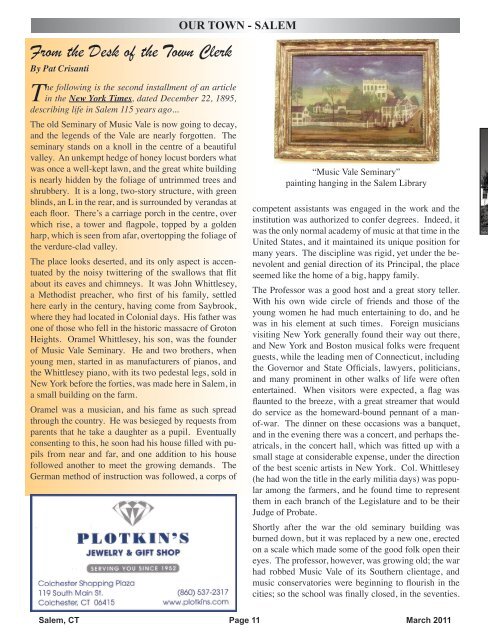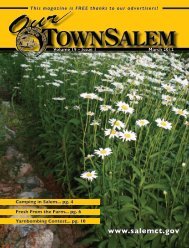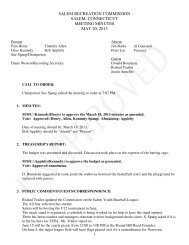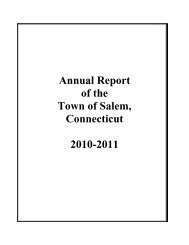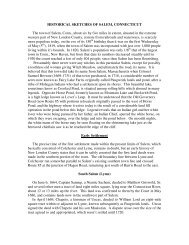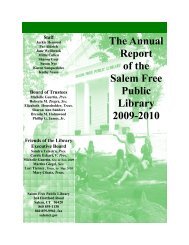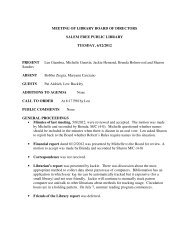Create successful ePaper yourself
Turn your PDF publications into a flip-book with our unique Google optimized e-Paper software.
From the Desk <strong>of</strong> the <strong>Town</strong> Clerk<br />
By Pat Crisanti<br />
OUR TOWN - SALEM<br />
The following is the second installment <strong>of</strong> an article<br />
in the New York Times, dated December 22, 1895,<br />
describing life in <strong>Salem</strong> 115 years ago...<br />
The old Seminary <strong>of</strong> Music Vale is now going to decay,<br />
and the legends <strong>of</strong> the Vale are nearly forgotten. The<br />
seminary stands on a knoll in the centre <strong>of</strong> a beautiful<br />
valley. An unkempt hedge <strong>of</strong> honey locust borders what<br />
was once a well-kept lawn, and the great white building<br />
is nearly hidden by the foliage <strong>of</strong> untrimmed trees and<br />
shrubbery. It is a long, two-story structure, with green<br />
blinds, an L in the rear, and is surrounded by verandas at<br />
each floor. There’s a carriage porch in the centre, over<br />
which rise, a tower and flagpole, topped by a golden<br />
harp, which is seen from afar, overtopping the foliage <strong>of</strong><br />
the verdure-clad valley.<br />
The place looks deserted, and its only aspect is accentuated<br />
by the noisy twittering <strong>of</strong> the swallows that flit<br />
about its eaves and chimneys. It was John Whittlesey,<br />
a Methodist preacher, who first <strong>of</strong> his family, settled<br />
here early in the century, having come from Saybrook,<br />
where they had located in Colonial days. His father was<br />
one <strong>of</strong> those who fell in the historic massacre <strong>of</strong> Groton<br />
Heights. Oramel Whittlesey, his son, was the founder<br />
<strong>of</strong> Music Vale Seminary. He and two brothers, when<br />
young men, started in as manufacturers <strong>of</strong> pianos, and<br />
the Whittlesey piano, with its two pedestal legs, sold in<br />
New York before the forties, was made here in <strong>Salem</strong>, in<br />
a small building on the farm.<br />
Oramel was a musician, and his fame as such spread<br />
through the country. He was besieged by requests from<br />
parents that he take a daughter as a pupil. Eventually<br />
consenting to this, he soon had his house filled with pupils<br />
from near and far, and one addition to his house<br />
followed another to meet the growing demands. The<br />
German method <strong>of</strong> instruction was followed, a corps <strong>of</strong><br />
occasions was a banquet, and in the evening there was a concert, and perhaps theatricals, in the concert hall, which<br />
was fitted up with a small stage at considerable expense, under the direction <strong>of</strong> the best scenic artists in New York.<br />
Col. Whittlesey (he had won the title in the early militia days) was popular among the farmers, and he found time<br />
to represent them in each branch <strong>of</strong> the Legislature and to be their Judge <strong>of</strong> Probate.<br />
“Music Vale Seminary”<br />
painting hanging in the <strong>Salem</strong> Library<br />
competent assistants was engaged in the work and the<br />
institution was authorized to confer degrees. Indeed, it<br />
was the only normal academy <strong>of</strong> music at that time in the<br />
United States, and it maintained its unique position for<br />
many years. The discipline was rigid, yet under the benevolent<br />
and genial direction <strong>of</strong> its Principal, the place<br />
seemed like the home <strong>of</strong> a big, happy family.<br />
The Pr<strong>of</strong>essor was a good host and a great story teller.<br />
With his own wide circle <strong>of</strong> friends and those <strong>of</strong> the<br />
young women he had much entertaining to do, and he<br />
was in his element at such times. Foreign musicians<br />
visiting New York generally found their way out there,<br />
and New York and Boston musical folks were frequent<br />
guests, while the leading men <strong>of</strong> Connecticut, including<br />
the Governor and State Officials, lawyers, politicians,<br />
and many prominent in other walks <strong>of</strong> life were <strong>of</strong>ten<br />
entertained. When visitors were expected, a flag was<br />
flaunted to the breeze, with a great streamer that would<br />
do service as the homeward-bound pennant <strong>of</strong> a man<strong>of</strong>-war.<br />
The dinner on these occasions was a banquet,<br />
and in the evening there was a concert, and perhaps theatricals,<br />
in the concert hall, which was fitted up with a<br />
small stage at considerable expense, under the direction<br />
<strong>of</strong> the best scenic artists in New York. Col. Whittlesey<br />
(he had won the title in the early militia days) was popular<br />
among the farmers, and he found time to represent<br />
them in each branch <strong>of</strong> the Legislature and to be their<br />
Judge <strong>of</strong> Probate.<br />
Shortly after the war the old seminary building was<br />
burned down, but it was replaced by a new one, erected<br />
on a scale which made some <strong>of</strong> the good folk open their<br />
eyes. The pr<strong>of</strong>essor, however, was growing old; the war<br />
had robbed Music Vale <strong>of</strong> its Southern clientage, and<br />
music conservatories were beginning to fl<strong>our</strong>ish in the<br />
cities; so the school was finally closed, in the seventies.<br />
<strong>Salem</strong>, CT Page 11 March 2011


